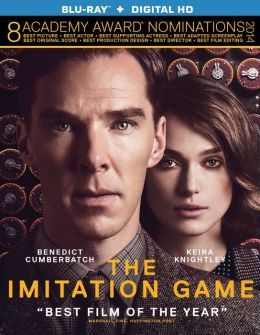"The Imitation Game" And The Nature Of Science, Epistemology And "Right Thinking"
Okay, I do NOT go to the movies for historical accuracy. Historical accuracy is utterly beside the point. One can argue till they're blue in the face that "truth is stranger than fiction" and it is. But it rarely comes neatly packaged in a tidy tale with a beginning and a middle and a satisfying end. So to heck with historical accuracy. But making a movie about Alan Turing that undermines the most noble and dramatically exciting part of his life is like making a movie about Rosa Parks and skipping the part where she refuses to go to the back of the bus. Or even worse, shows her not bothering to get on in the first place because she doesn't want to cause a fuss. Alan Turing was a hero. He helped a team crack countless German codes -- including the Enigma machine (building on work done by Poles) -- and Turing and others significantly helped win the war. Ironically, Turing was betrayed by his country in a sense when it prosecuted him for being gay. However, while his country betrayed him, Turing never betrayed his country. He kept silent about his war work when a lesser man might have said in his defense, hey, you know I helped win the war, right? He died, perhaps by suicide and is unquestionably a gay hero whose story helped the push for equal rights in the UK. The best biography is by Andrew Hodges from back in 1983, now retitled Alan Turing: The Enigma. His life also inspired the excellent play Breaking The Code,which Derek Jacobi played on stage and for TV. Both naturally encompass his messy, memorable life with the play staying true to Turing while entertaining audiences and creating a dramatically satisfying work.
The film The Imitation Game does none of this. It shows Turing -- remarkably - being blackmailed over his homosexuality when no such thing occurred. Instead of being a hero who saved his country and refused to trade on that service to save his skin, Turing here capitulates and allows himself to be silenced and never reveal a traitor in their midst at Bletchley Park. Good God, what were they thinking? He is, essentially, a tragic homo who must of course die at the end (preferably by his own hands) so the straight people can survive and tut-tut and speak nicely of that odd, strange, utterly inhuman man. (Turing is practically autistic in the film, with an inability to handle even the smallest social niceties.) He's shown pouring his heart out to a policeman when confronted with his crime of being gay, divulging all his wartime work to -- again -- try and justify himself and perhaps save his own skin. Shame on the Human Rights Campaign for honoring this load of codswallop that actually dishonors the achievements of Turing, a key figure in the development of the computer. That's just for starters in terms of dishonest and undermining of Turing and what he did. (Others lay out a more coherent case for Turing and against the film, including Christian Caryl with this thorough, intelligent take-down for the New York Review of Books.)
But if possible let's forget that and deal with the film. Knowing nothing of Turing's life, you'd still surely spot how artificial and false the film seems. Keira Knightley is a lovely actress and I can buy her as smart. But when you've got Benedict Cumberbatch AND Matthew Goode AND the handsome Allen Leech AND the coltish Matthew Beard and then toss Keira Knightley on top of them all, well you've got the sexiest damn group of cryptographers in history. It beggars belief, to say the least. A cumbersome inspirational message is told to Turing as a lad (where he has a tragic first love, of course) and then it's repeated again and again and again. "Sometimes it is the people who no one imagines anything of who do the things no one can imagine" is pretty godawful (and nonsensical) the first time around. But it gets worse and worse and more freighted with symbolism with every repetition. The Imitation Game is a stiff, dull bore from start to finish. And the more you learn about Turing, the more genuinely fascinating and dramatic his life proves. And the more you feel betrayed by this movie that betrayed him. Read the Hodges book. See the play. Avoid The Imitation Game, which is exactly that. A poor imitation and a sorry game where we're all the losers.
Michael Giltz

No comments:
Post a Comment